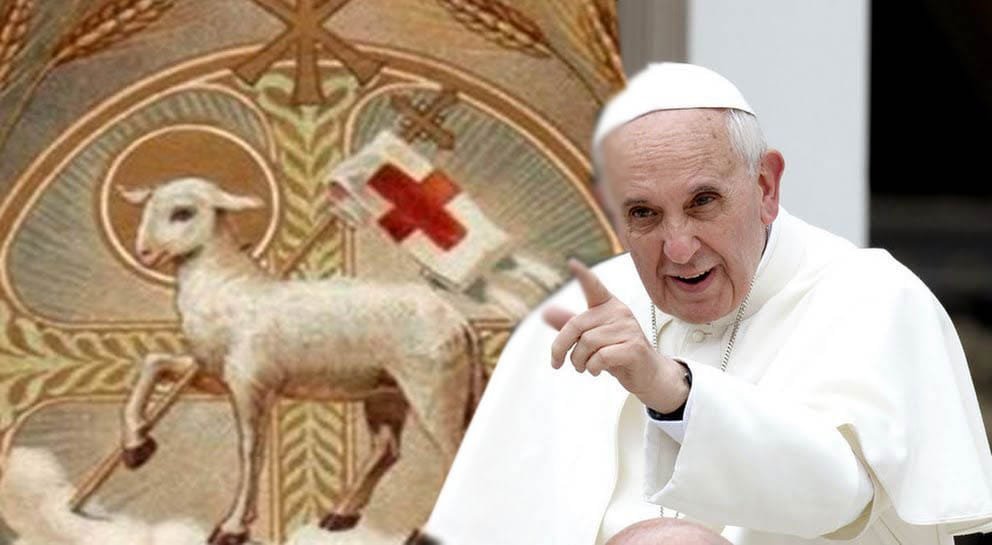POPE FRANCIS ON THE 4TH SUNDAY OF EASTER C. GOOD SHEPHERD SUNDAY

REGINA CAELI
Saint Peter’s Square
4TH SUNDAY OF EASTER C, 8 May 2022
_________________________________
Dear brothers and sisters, buongiorno!
The Gospel for today’s Liturgy speaks to us about the bond that exists between the Lord and each one of us (cf. Jn 10:27-30). In doing so, Jesus uses a tender image, a beautiful image of the shepherd who stays with the sheep. And he explains it with three verbs: “My sheep”, Jesus says, “hear my voice, and I know them, and they follow me” (v. 27). Three verbs: hear, know, follow. Let us take a look at these three verbs.
First of all, the sheep hear the voice of the shepherd. The initiative always comes from the Lord. Everything comes from his grace: it is he who calls us to communion with him. But this communion comes about if we open ourselves to listen. If we are deaf, he cannot grant us this communion. Open ourselves to listening, because listening implies availability, it implies docility, it implies time dedicated to dialogue. Today, we are inundated with words and by the urgency to always have something to say or do. How often two people are talking and the one does not wait for the other to finish his or her thought, but cuts the other off mid-sentence, and responds…. But if we do not allow another to speak, there is no listening. This is an ailment of our time. Today, we are inundated with words, by the urgency to always have something to say or do. We are afraid of silence. How hard it is to listen to each other! To listen till the end, to let the other express him or herself, to listen in our families, to listen at school, to listen at work, and even in the Church! But for the Lord, it is first of all necessary to listen. He is the Word of the Father, and the Christian is a listening child, called to live with the Word of God at hand. Let us ask ourselves today if we are listening children, if we find time for the Word of God, if we give space and attention to our brothers and sisters, if we know how to listen until the other has finished speaking, without cutting off what the other is saying. Those who listen to others know how listen to the Lord, too, and vice versa. And they experience something very beautiful, that is, that the Lord himself listens – he listens to us when we pray to him, when we confide in him, when we call on him.
Listening to Jesus thus becomes the way for us to discover that he knows us. This is the second verb that concerns the good shepherd. He knows his sheep. But this does not only mean that he knows many things about us. To know in the biblical sense also means to love. It means that the Lord, “while he reads our inner beings,” loves us, he does not condemn us. If we listen to him, we discover this – that the Lord loves us. The way to discover the Lord’s love is to listen to him. Thus, our relationship with him will no longer be impersonal, cold or a front. Jesus is looking for a warm friendship, trust, intimacy. He wants to give us a new and marvelous awareness – that of knowing we are always loved by him and, therefore, that we are never left alone by ourselves. Being with the good shepherd allows us to live the experience what the Psalm speaks about: “Even though I walk through the valley of the shadow of death, I fear no evil; for you are with me” (Ps 23:4). He sustains us above all in our sufferings, in our difficulties, in our crises – which are dark – by going through them us. And so, it is specifically in difficult situations, that we can discover that we are known and loved by the Lord. So, let us ask ourselves: Do I let the Lord know me? Do I make room for him in my life? Do I bring what I am living to him? And what idea do I have of him after the many times I have experienced his closeness, his compassion, his tenderness? That the Lord is near, that the Lord is the good shepherd?
Lastly, the third verb: the sheep who hear, and who discover they are known, follow: they listen, they experience they are known by the Lord and they follow the Lord who is their shepherd. What do those who follow Christ do? They go where he goes, along the same path, in the same direction. They go to seek those who are lost (cf. Lk 15:4), are interested in those who are far-off, take to heart the situation of those who suffer, know how to weep with those who weep, they reach out their hands to their neighbour, placing him or her on their shoulders. And me? Do I let Jesus love me, and by allowing him to love me, do I pass from loving him to imitating him? May the Holy Virgin help us listen to Christ, know him always more and follow him on the way of service. Hearing him, knowing him, following him.
Source: https://www.vatican.va/content/francesco/en/angelus/2022/documents/20220508-regina-caeli.html
REGINA COELI
Saint Peter’s Square
4th Sunday of Easter C, 12 May 2019

Dear Brothers and Sisters, Good morning!
In today’s Gospel passage (cf. Jn 10:27-30) Jesus is presented to us as the true Shepherd of the People of God. He speaks about the relationship that binds him to the sheep of the flock, namely, to his disciples, and he emphasizes the fact that it is a relationship of mutual recognition. “My sheep” — he says — “hear my voice, and I know them, and they follow me; and I give them eternal life, and they shall never perish” (vv. 27-28). In carefully reading this phrase, we see that Jesus’ work is explained in several actions: Jesus speaks; Jesus knows; Jesus gives eternal life; Jesus safeguards.
The Good Shepherd — Jesus — is attentive to each one of us; he seeks us and loves us, addresses his Word to us, knowing the depths of our heart, our desires and our hopes, as well as our failures and disappointments. He accepts us and loves us as we are, with our merits and our faults. He “gives eternal life” to each one of us: that is, he offers us the opportunity to live a full life, without end. Moreover, he safeguards us and leads us lovingly, helping us to cross impervious paths and the sometimes dangerous roads that appear in life.
The verbs and actions that describe the way in which Jesus, the Good Shepherd, interacts with us correspond to the verbs that relate to the sheep, namely us: “hear my voice”, “follow me”. They are actions that show how we must correspond to the tender and caring attitudes of the Lord. Indeed, hearing and recognizing his voice, implies intimacy with him, which is strengthened in prayer, in the heart-to-heart encounter with the divine Master and Shepherd of our souls. This intimacy with Jesus, this openness, speaking with Jesus, reinforces in us the desire to follow him, by emerging from the labyrinth of errant ways, abandoning selfish behaviour in order to set out on new paths of fraternity and of self-giving, in imitation of him.
Let us not forget that Jesus is the only Shepherd who speaks to us, knows us, gives us eternal life and safeguards us. We are the only flock and we only have to strive to hear his voice, while he lovingly examines the sincerity of our hearts. And from this constant intimacy with our Shepherd, from this colloquy with him, springs the joy of following him, allowing ourselves to be led to the fullness of eternal life.
Let us now turn to Mary, Mother of Christ the Good Shepherd. May she, who readily responded to God’s call, help in particular those who are called to the priesthood and to consecrated life to joyfully and willingly accept Christ’s call to be his more direct coworkers in proclaiming the Gospel and at the service of the Kingdom of God in this age of ours.
Source: https://www.vatican.va/content/francesco/en/angelus/2019/documents/papa-francesco_regina-coeli_20190512.html
Emphasis mine.

REGINA CÆLI
Saint Peter’s Square
4th Sunday of Easter C, 17 April 2016
Dear Brothers and Sisters, Good morning!
Today’s Gospel (Jn 10:27-30) offers us some of Jesus’ expressions during the feast of the dedication of the Temple of Jerusalem, which is celebrated at the end of December. He is found on the Temple grounds, and perhaps that enclosed sacred space suggested to Him the image of the sheepfold and the shepherd. Jesus is presented as “the Good Shepherd”, and says, “My sheep hear my voice, and I know them, and they follow me; and I give them eternal life, and they shall never perish, and no one shall snatch them out of my hand” (vv. 27-28). These words help us to understand that no one can call himself a follower of Jesus, if he does not listen to His voice. And this “listening” should not be understood in a superficial way, but in an engaging way, to the point of making possible a true mutual understanding, from which one can come to a generous following, expressed in the words, ‘and they follow me’ (v. 27). It is a matter of listening not only with ears, but listening with the heart!
And so, the image of the shepherd and the sheep indicates the close relationship that Jesus wants to establish with each one of us. He is our guide, our teacher, our friend, our model, but above all he is our Saviour. In fact, the following expressions from the Gospel passage affirm, “I give them eternal life, and they shall never perish, and no one shall snatch them out of my hand” (v. 28). Who can say that? Only Jesus, because the “hand” of Jesus is one thing with the “hand” of the Father, and the Father is “greater than all” (cf. v. 29).
These words communicate to us a sense of absolute security and immense tenderness. Our life is fully secure in the hands of Jesus and the Father, which are a single thing: a unique love, a unique mercy, revealed once and for all in the sacrifice of the Cross. To save the lost sheep which we all are, the Shepherd became lamb, and let himself be immolated so as to take upon himself and to take away the sin of the world. In this way he has given us life, life in abundance (cf. Jn 10:10)! This mystery is renewed, in an always surprising humility, on the Eucharistic table. It is there that the sheep gather to nourish themselves; it is there that they become one, among themselves and with the Good Shepherd.
Because of this we are no longer afraid: our life is now saved from perdition. Nothing and no one can take us from the hands of Jesus, because nothing and no one can overcome his love. Jesus’ love is invincible. The evil one, the great enemy of God and of his creatures, attempts in many ways to take eternal life from us. But the evil one can do nothing if we ourselves do not open the doors of our hearts to him, by following his deceitful enticements.
The Virgin Mary heard and obediently followed the voice of the Good Shepherd. May she help us to welcome with joy Jesus’ invitation to become his disciples, and to always live in the certainty of being in the paternal hands of the Father.
Source: https://www.vatican.va/content/francesco/en/angelus/2016/documents/papa-francesco_regina-coeli_20160417.html
Emphasis mine.
HOMILY OF HIS HOLINESS POPE FRANCIS
Vatican Basilica
Sunday, 12 May 2019

Dearest Brothers and Sisters,
Our sons have been called to the order of priests. It will do us all good to consider carefully the position to which they are to be promoted in the Church. It is true that the Lord Jesus is the High Priest of the New Testament and God has also made his entire people a royal priesthood in Christ. But Jesus Christ also chose some of his followers to carry out publicly in the Church a priestly ministry in his name on behalf of mankind, continuing his personal mission as Teacher, as Priest, as Shepherd.
Indeed, for this reason he was sent by the Father, and he in turn sent into the world the Apostles, and then the Bishops and their successors. Priests are co-workers of the order of Bishops, to whom they are joined in the priestly office and are called to serve the People of God.
After many years of reflection — their own reflection, the reflection of their superiors, of those who have accompanied them on this path —, they have presented themselves today so that I may confer on them the priestly Order.
They are called to be molded into the likeness of Christ, the Supreme and Eternal Priest. By consecration, they will be made true priests of the New Testament, and in this role, sharing in the priesthood of their Bishop, to preach the Gospel, sustain God’s people, and preside at rites of worship, above all the celebration of the Lord’s sacrifice, that is, the Eucharist.
My beloved brothers and sons, you are now to be advanced to the order of the presbyterate. You must apply your energies to the duty of teaching in the name of Christ, the chief Teacher. This is not a cultural association; it is not a union. You will participate in Christ’s ministry. Share with all mankind the Word of God you received with joy. And for this reason, read and meditate on the Word of the Lord, believe what you read, teach what you believe, and put into practice what you teach. You should never deliver a homily without much prayer, with the Bible in hand. Do not forget this.
Let the doctrine you teach be true nourishment for the People of God: when it comes from the heart and arises from prayer, it will be very fruitful. Let the example of your life attract the followers of Christ: men of prayer, men of sacrifice so that by word and action you may build up the House of God which is the Church. In the same way you must continue the sanctifying work of Christ. The spiritual sacrifice of the faithful will be perfected through your ministry, united to Christ’s sacrifice, and through your hands be offered sacramentally on the altar in celebration of the Holy mysteries. Be attentive in the celebration of the Eucharist.
Know what you are doing and imitate the mystery you celebrate. In memory of the Lord’s death and Resurrection, carry Christ’s death within you and walk with him in the newness of life.
The Lord wished to save us gratuitously. He himself said: “Freely give what you freely received”. The celebration of the Eucharist is the culmination of the Lord’s gratuitousness. Please do not soil it with petty interests.
When you baptize you will bring new men and women into the People of God. In the Sacrament of Penance, you will forgive sins in the name of God, of Christ and of the Church. And here, I ask you, please, never tire of being merciful. Merciful like the Father, as Jesus was merciful with us, with all of us. With holy oil you will relieve and console the sick. Idle away time visiting the sick and the invalid. You will celebrate the liturgy and offer thanks and praise to God throughout the day, praying not only for the People of God, but for the whole of humanity.
Remember that you are chosen from among mankind and appointed to act in their favour by attending to the things of God. Carry out the work of Christ’s ministry with genuine joy and love, with sincerity, seeking only to please God and not yourselves. Priestly joy is found only on this path, in trying to please God who elected us.
Finally conscious of sharing in the work of Christ, the head and Shepherd of the Church, and united with the Bishop and subject to him, seek to bring the faithful together into a unified family. These are the affinities proper to priests: close to God in prayer, close to the bishop who is your father, close to the presbytery, to other priests, as brothers, without excoriating each other [speaking ill of each other], and close to the People of God. Always keep in mind the example of the Good Shepherd who came not to be served but to serve and to seek out and rescue those who were lost.
Stay updated: subscribe by email for free TO OUR NEW WEBSITE www.catholicsstrivingforholiness.org (PUT YOUR EMAIL IN THE SUBSCRIBE WIDGET).
We are also in www.fb.com/Catholicsstrivingforholiness. Kindly help more people in their Christian life by liking our page and inviting your family, friends and relatives to do so as well. Thanks in advance and God bless you and your loved ones! Fr. Rolly Arjonillo


